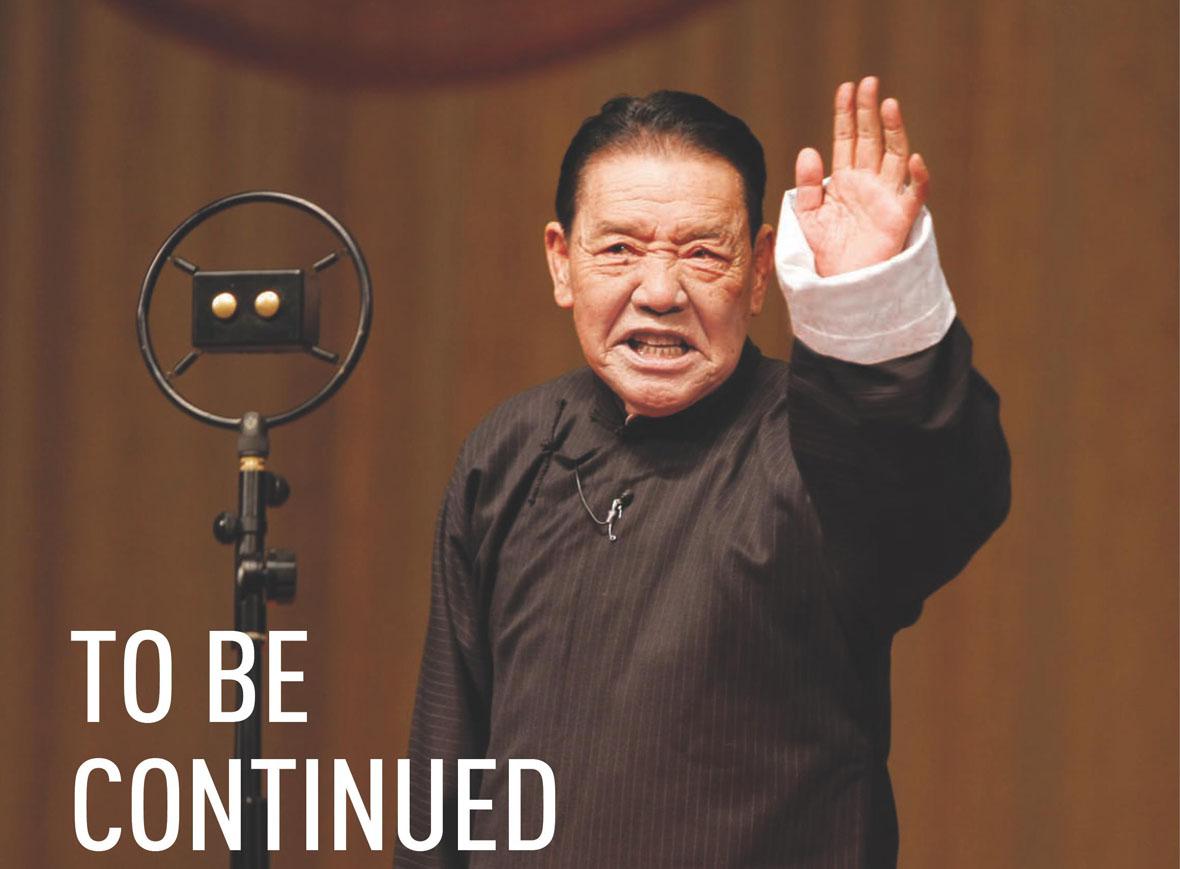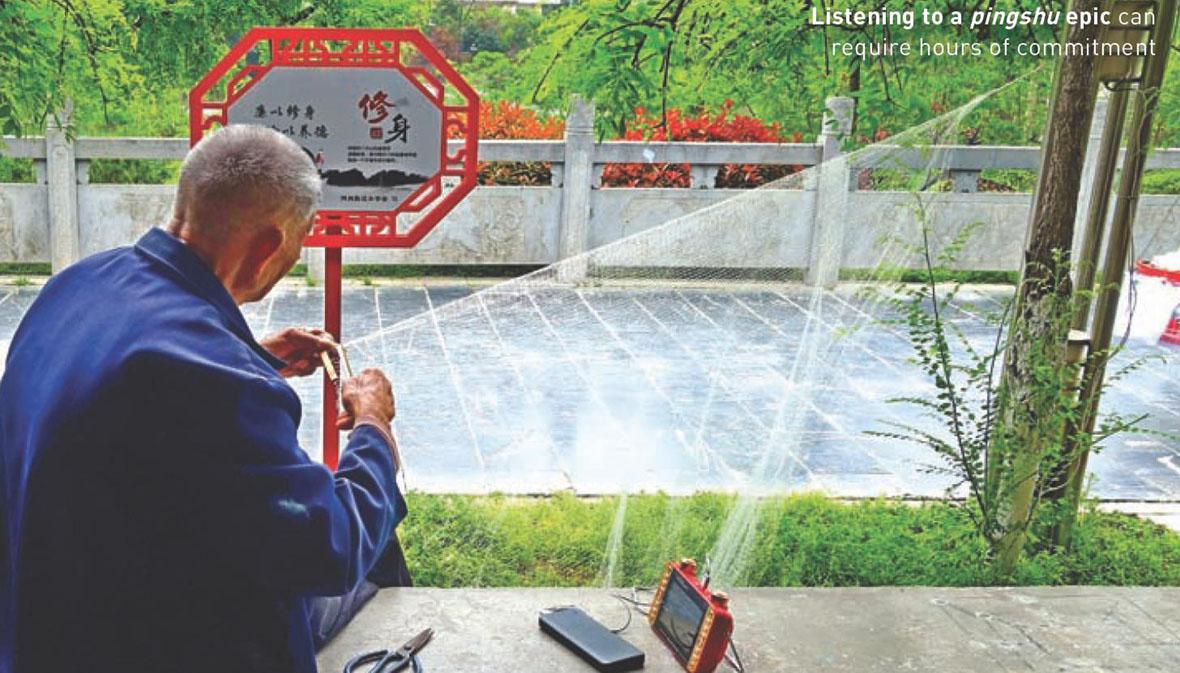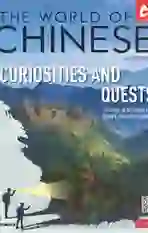To Be Continued
2018-01-22谭云飞
谭云飞


With the death of its most influential master, what does the future hold for the thousand-year art of “book commentary?”
大师单田芳离我们而去,新时代受众的需求也不同往日,
评书艺术后事如何,谁来分解?
To be continued in the next chapter,” was pingshu master Shan Tianfangs (单田芳) signature sign-off, the rasping conclusion to more than 12,000 radio episodes “book commentaries” recorded over a 60-year career.
September 11 saw the final chapter in the life of a storyteller whose idiosyncratic renditions of classic Chinese texts made him a national treasure, as Shan died aged 83. Four days later, his iconic catchphrase was repeated over headphones worn by thousands of loyal fans who attended Shans memorial at Beijings Babaoshan Cemetery, many worried who would turn the next page of this declining traditional art.
“My fathers only regret was that he was unable to finish recording a few epics before his death,” wrote Shans daughter, Shan Huili, in an open letter published after his death. “This regret embodied my fathers anxiety over the inheritance and development of the pingshu (评书, book commentary) art over the years.”
Nor was Shan the first aging master to worry about pingshus fate. In 2008, the late performer Jin Wensheng told media, “[Im afraid] pingshu is going to disappear when I die…so I must not die.”
Shan did more than his share to preserve pingshu: In his lifetime, he produced radio and television recitals of more than 110 stories, spanning 6,000 hours, ensuring that records of his performances will long outlive him.
Born Shan Chuanzhong to a family of folk performers in Yingkou, Liaoning province, in 1934, Shan had aspired to leave the life of an itinerant entertainer. However, in 1954, he was forced to drop out of college for financial reasons, and became an apprentice of pingshu master Li Qinghai.
When Shan made his debut in a teahouse in Anshan, Liaoning, in 1956, pingshu was just beginning to hit the airwaves. Its claimed that pingshu, also known as pinghua (評话) and pingci (评词), was invented by the legendary King Zhuang of the Eastern Zhou dynasty (770 BCE – 265 BCE). A more plausible ancestor is the stage art of shuochang (说唱, “speaking-singing”), which was popular in areas south of the Yangtze River during the Tang dynasty, and later spread to Beijing. In later centuries, when performed at the imperial palace, the singing parts were replaced with “commentary.”
“Among the numerous professions,pingshuis the most difficult to master,” according to a folk verse. “It is not easy to master the narration, commenting, and acting involved, which requires memorizing thousands of lines.” Based on the study of classic Chinese novels and history, the storyteller composes an oral script that narrates the story, with occasional asides to explain background information or comment on the characters, their actions, or their motivations.
The script then has to be memorized and recounted using different gestures and voices for each character (or as the verse has it: “The voice shall be loud and vary in speed and volume. The storyteller alone stages a drama consisting of both literary and fighting parts”). Traditionally, artists performed live at a teahouse or a stall in the market, standing behind a wooden table with only a handkerchief, folding fan, and wooden block with which to make the sound effects—along, of course, with the magic of their voice.
Shans iconic “cloud covering the moon” rasp, which seemed particularly suitable for narrating historical epics, was actually the result of throat surgeries for infections he developed during the Cultural Revolution—when he was branded a “counterrevolutionary” and sentenced to hard labor in northeastern China. After enduring what he called “lifes greatest suffering,” Shan resumed storytelling in 1979, this time recording a historical novel, The Romance of the Sui and Tang Dynasties, for Anshan Radio Station. Premiering on Chinese New Year in 1980, this serial was eventually heard by over 100 million listeners during its 56 hours of broadcast.
In the 1980s, pingshus popularity rode on the coattails of radio, becoming a nationally popular entertainment as a portable wireless found itself into most households. Shan, along with Yuan Kuocheng, Liu Lanfang, and Tian Lianyuan were known as the “four major contemporary pingshu masters,” renowned as much for their impeccable memories as their storytelling flair. “Ive actually read some of those novels before listening to Shan, but it is his narration, with background details and commentary, that brings all characters and scenes to life,” Mr. Zhao, a retired worker from Beijing who now owns an antique stall, told TWOC.
Cui Minsheng, a 59-year-old Beijing taxi driver, has listened to Shan ever since he started driving, over 20 years ago. “I drive 12 to 24 hours a day, and always listen to pingshu as I drive,” he explained. “Sometimes, to find out what happens next, Id skip eating or chatting with colleagues so I could stay in the car.” Dubbed “the voice of the taxi,” as listening to him is believed to be the best time-killer in traffic, Shans plain language and energetic delivery appealed to both literate and illiterate listeners. “I never went to school, so Ive never read these stories before, though Ive heard some from my elders. Shans performance gives me more details and comments,” Cui says.
Yet the situation is vastly different for the “post-80s” and “post-90s” generations. “My first idea was that my father must be sad,” 25-year-old Liu Siyao responded vaguely, after hearing news of Shans death. As a child, Liu was “forced” to listen to Shan by herpingshu-loving father, who was even inspired to become a police officer by the tales of heroism and morality he heard on the radio. However, by the time that Shan retired in 2007, younger and more cynical listeners, who grew up with other entertainment options, began to consider these radio serials old-fashioned, slow-paced, or simply too long.
“While driving, I like to listen to something more interesting and entertaining, such as music or [talk shows about] relationships, to relieve the pressure of work and modern life,” Guo Qiang, a 35-year-old white-collar worker and part-time Didi driver, tells TWOC. “Unlike taxi drivers, we dont have much time to follow a full story.”
Shan was not deaf to the need to modernize his profession. Since the early 1980s, he had been collecting, composing, and recording new stories to expand the limited traditional pingshu repertoire. Taking a bachelors degree in history by correspondence, Shan also corrected many inaccuracies in the classic scripts and conducted meticulous research before writing his own.
In 1995, he founded his own pingshu production company in Beijing, Shan Tianfang Culture Communication Company, and cooperated with over 400 radio stations to broadcast his performances. Three of his original scripts, White-Browed Hero, Mountain and River Tears, and Heroes of Adventure have been adapted into TV series. Shan cultivated more than 30 adult apprentices and even ran his own Weibo account, now inherited by his daughter, who set up a pingshu school in 2017.
The masters influence has also been felt in other traditional arts: “His voice is so special that in a certain period, many performers in short sketch, crosstalk, and other folk arts imitated him,” crosstalk performer Miao Fu told news site The Paper. “Thats the artistic influence of a master.” However, when Shan took in his last apprentices in 2010, he warned them about the danger of imitation. “Master kept telling us, ‘Dont copy my voice, dont copy my scripts, but focus on creativity,” one student, Shenyang radio host Sun Gang, told the Shenyang Daily.
Indeed, according to pingshu master Liu Lanfang, lack of new content is one of the major roadblocks to pingshu modernization. “The hundred or so traditional books have all been more or less adapted in the 80s, 90s, until the 2000s; their scripts are all used up,” Liu told China News in March. “You cant adapt as much [content] from modern works, though some [scripts] are being written.” Shan also tackled the heart of the problem in a 2010 interview with the Yangtse Evening News. “In my days, there was more of an intellectual atmosphere; every day we studied politics, current events, and did artistic exchange…now, everyone is chasing profits.”
Additionally, the life of a performer remains difficult. “Pingshuartists in their 20s have to travel on packed subways or buses to go perform on the outskirts of Beijing, and only earn 150 RMB per hour,” Liu told Xinhua in 2015. “The folk arts are difficult; without 10 or 20 years of practice and experience, you cannot enrapture an audience…[but] with so little income, its difficult to get young people to invest these efforts.”
But young artists have begun to publish performances on Weibo, sometimes edited down for length. Amateur performer Zhang Zhun has gotten up to 54,000 views for his episodes of “creative pingshu”—20-minute narrations of the Japanese comic One Piece. “On the weekend, I still go to pingshu halls to narrate traditional pingshu…the audience is mostly elderly,” Zhang told China Youth Daily in 2012.
Later, he told Tianjins Metro Express, “I hope to attract young listeners to the art by narrating One Piece in a pingshu style, but of course, my personal influence is like a cup of water before a burning car…at least, some people who have never heard of pingshu before now know what it is.”
